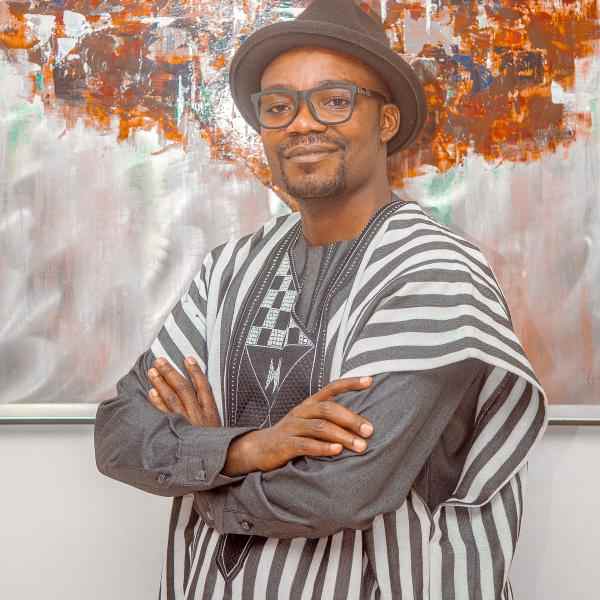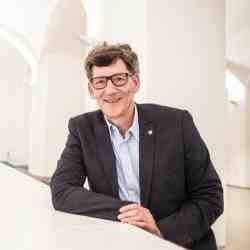Introduction
Three-quarters of citizens in the DRC lack access to bank accounts and microfinance services. Beginning with community savings groups in 2014, Héritier has created an innovative incentive system for ground banking agents that helps in expanding financial inclusion via financial literacy. He has successfully pushed for reforms in financial regulation that migrate these established shared savings groups into formal savings and loans associated with health insurance services. Now he is spreading this approach across the DRC.
The New Idea
Héritier has created a system that transforms and accelerates the upward mobility and financial inclusion of the unbanked population in the Democratic Republic of Congo (DRC) living in deep poverty without economic opportunities to meet basic socio-economic needs. Two-thirds of the Congolese population (80 million people) lack access to banking and financial services, especially the elderly, women, young people, and those living in rural areas who can’t physically access banks because of the long distance and have lost their livelihoods through repeated armed conflicts.
His organization, RAVEC, deploys proximity banking agents in different zones of the DRC to organize women, youth, and local leaders into solidarity groups, provide financial literacy training and business advisory services, help people open accounts, and offer credit. Upon completion of the training, RAVEC integrates the group into its network, where each member can access information on their personal savings and borrowings from the collective account. Each proximity agent’s incentive structure is equally weighted and rewarded for recruiting unbanked individuals, forming them into savings groups and providing them with services and support that will grow the group’s ability to, individually and collectively, qualify them to join BCECOLOANS, the social finance institution established by Héritier. This empowers the unbanked and underserved individuals, enabling them to participate actively in the financial ecosystem. Héritier also leverages social capital by collaborating with local associations to co-create a model that emphasizes human capital development and capacity building to establish social trust and facilitate access to affordable financial services.
Unlike conventional banks and financial institutions, which require material guarantees, Héritier’s approach focuses on the borrower’s human capacity to repay rather than relying solely on material guarantees. RAVEC transcends traditional financial services, introducing a community-centric banking and health insurance program designed to ensure comprehensive coverage and financial stability for all. Prioritizing the intersection of economic prosperity and physical well-being, RAVEC guarantees rapid access to top healthcare through partnerships with the best hospitals in the country. The program streamlines healthcare assistance requests through a digital platform and offers mobile transport services for patients, ensuring swift and efficient access to medical care. Complementing an extensive 80% medical coverage, RAVEC provides continuous access to a dedicated medical advisor for free consultations, guiding members through crucial health decisions. This insurance work not only eases the financial burdens on Congolese families but also empowers them to concentrate on the well-being of their loved ones. By securing their health, RAVEC members gain the confidence to access loans and fulfil repayments, fortified by the assurance of their health coverage.
Through the fusion of banking and health insurance services, this innovative model fosters community empowerment, enabling collective poverty alleviation and mutual support. Héritier’s health insurance initiative offers families relief from medical expenses, promoting the growth of their businesses and nurturing a culture of solidarity and economic resilience among all participants. The outcomes of the five-year recruitment and training campaign have been incredibly fruitful, prompting Héritier to approve the expansion of the Proximity Banking Agent network to potentially incorporate 3,000 agents across the DRC. The initial objective is to target around one-third of the 22 million unbanked individuals in the country within the upcoming 5-7 years.
Héritier has also established a network of partners dedicated to advancing financial inclusion and literacy. Each year, an annual summit is orchestrated to unite French-speaking nations in collaborative efforts towards enhancing financial inclusion and literacy. This summit serves as a platform for introducing fresh perspectives and advocating for policy changes among decision-makers across the continent. The Social Microfinance and Entrepreneurship Summit is a pivotal gathering that convenes key stakeholders including decision-makers from the DRC and other nations, microfinance regulators, banking institutions, MFIs, cooperatives, and community members benefiting from financial services. Through the exchange of best practices on financial inclusion, the summit aims to influence Congolese microfinance entities to revise internal regulations and embrace inclusive financial practices. Subsequent to these deliberations, a roadmap of recommendations is formulated and presented to Congolese authorities and regulators to catalyze reforms and dismantle outdated policies inhibiting effective financial inclusion in the DRC.
The Problem
In the DRC, 74% of the population, roughly 80 million people, are unbanked. According to the World Bank, only 26% of the adult population in the DRC have accounts with financial institutions, with 14% having accounts with banks and 12% with microfinance institutions. Additionally, of the 26% of people who own accounts, only one-third lives in “rural areas.”
People require financial literacy to effectively address their challenges – yet financial illiteracy remains a common issue across all African countries that share a colonial history. In the DRC, various factors have limited people’s access to financial institutions. First, obtaining material guarantees, such as permanent homes or registered land, as collateral for loans is very difficult for most of the population, especially given the on-going political instability and civil war in the region. Furthermore, access to private banking within the DRC is limited to people with access to the branches of foreign-owned banks headquartered outside the DRC. The absence of Congolese-owned banks can be attributed to factors such as government preference for foreign entities, heavy regulations, and high dollarisation in the financial sector. Finally, there is a high barrier to entry to open an account, including fees, strict account opening requirements, discouraging bank transaction policies, and a lack of functional payment systems. This has led to the prevalence of an informal cash-based economy and low public trust in the banking system.
Additionally, the reliance on correspondent banks for transactions and the impact of international sanctions on prominent Congolese nationals have further hindered the establishment of local banks. Branches of foreign-only commercial banks in the DRC are mainly located in the big cities, serving the wealthy who can access loans. Rural areas, which also need financial services, are largely neglected. The lack of incentives for proximity banking agents to operate in rural and peri-urban areas, where banks hesitate to venture due to insecure infrastructure and uncertain business growth prospects, poses challenges for microfinance institutions (MFIs) in the country. Establishing a well-trained banking agent system forms the foundation for addressing the unbanked population effectively.
The consequences of financial exclusion are severe. Without a way to save, families face irregular incomes, perpetuating extreme poverty. Marginalized people have difficulty accessing quality healthcare, food security, education for their children, adequate housing, and drinking water. This, in turn, is a vicious cycle. Communities that lack financial means to access healthcare face health problems that can impact their incomes and their ability to repay loans. Excessive and unpredictable healthcare expenses prevent people from growing their business, when health costs can take everything that they’ve earned. Families become more vulnerable to financial risks such as accidents, illness, and unemployment. As a result, they often rely on costly and insecure informal sources of finance, such as loan sharks, pawnbrokers, or informal networks.
The Strategy
To reduce the number of unbanked people by a third within the next five years, Héritier implements a strategic approach involving federating, structuring, professionalizing, and formalizing local village savings and credit groups through financial training and structural support. His organization, RAVEC, also connects these groups to health insurance and access to BCECOLOANS, the social financial institution established by Héritier to provide savings accounts and loans. The overarching objective is to create economically vibrant communities where every individual has a bank account by 2030.
The process involves studying community needs, raising awareness about RAVEC’s services, and forming solidarity groups. Members receive financial literacy training and learn about banking, rights to loans, and business guidance. Leveraging Héritier’s blockchain technology, RAVEC ensures secure and transparent transactions by local agents, who earn a percentage of transactions for clients and new accounts. Each Proximity Banking Agent, mobilized by Héritier, is expected to serve 7,500 unbanked individuals. They conduct market research, open new accounts, and establish savings and loan groups. Agents use RAVEC’s software to ensure secure transactions, governance, and fraud prevention.
Once community members are sensitized to form a solidarity group, they are informed about RAVEC’s approach to social protection and health insurance. Upon joining, members are educated to co-finance their health insurance for only $20 a year, renewable annually. They are encouraged to show solidarity towards fellow RAVEC members, understanding that their contribution aids in treating other members even if they remain healthy throughout the year.
Héritier strategically implements health insurance to build healthy communities. Affordable and accessible options ensure financial protection for medical expenses, alleviate healthcare costs, and promote preventive care. Prioritizing community members’ well-being, this initiative contributes to overall development and prosperity. To ensure access to quality healthcare and prevent financial strain due to unpredictable and excessive medical expenses, RAVEC provides 80% coverage for medical care throughout the year for its members and their families upon joining. In return, each member contributes $20 annually to RAVEC for their insurance, regardless of the number of illnesses or the total bill. RAVEC members either contribute the annual fee or co-finance their insurance with low-interest loans from their group. RAVEC covers the remaining 80% of their medical bills through interest from the invested annual fees. In this way, members ultimately become 100% financiers of their health insurance.
To ensure timely access to quality healthcare, RAVEC contracts with reputable hospitals that provide medical care under RAVEC’s guarantee. RAVEC has established a digital channel for quick assistance requests and provides mobile means for patient transportation to the hospital. In addition to the 80% medical coverage, RAVEC has a permanent medical advisor available 24/7 to offer free medical advice to its members.
RAVEC plays a pivotal role in organizing communities into savings and credit groups, facilitating access to essential financial services. Héritier has gone one step further by establishing BCECOLOANS, a local financial institution where savings and loan groups can open accounts and access larger loans. Once groups undergo financial education with their banking agent, their group can join BCECOLOANS, making it convenient for individuals to open bank accounts and access financial services without extensive travel. By simplifying the application process and reducing collateral requirements, BCECOLOANS has enhanced accessibility for unbanked communities. BCECOLOANS, under RAVEC’s nonprofit umbrella, provides groups with borrowing limits linked to their savings. Individual accounts are offered as businesses grow, enabling access to larger loans. By focusing on community needs, BCECOLOANS aims to enhance financial inclusion in rural and peri-urban DRC areas.
Héritier also mobilizes collaborations with local, national, and international partners, recognizing their strategic value to multiple RAVEC’s impact. For scalability, Héritier collaborates with various technical partners, including foundations, NGOs and international development agencies such as the World Bank (through Project TRANSFORMER), as well as financial partners including VISA Foundation and European development agencies, to serve poor and rural areas.
For example, Agence Francaise de Development (AFD) contributed to a six-month capacity-building program and provided financing for new branch offices, resulting in a significant increase in beneficiaries for scaling RAVEC work across the DRC. They also financed digital software for BCECOLOANS, resulting in a doubling of loaning numbers. Additionally, AFD provided financing of 600,000 Euros. Swiss cooperation further supported the initiative with a financing of 190,000 USD to include women beneficiaries and street youths in accessing financial services. The Segal Family Foundation contributed 49,500 USD for women’s empowerment.
These partnerships are crucial for scaling Héritier’s model, enabling the opening of free banking accounts for underprivileged community members, enhancing efficiency and coordination, leading to improved regulations, better conditions, and increased impact, thereby maximizing the funding’s effectiveness in promoting financial inclusion and development. Membership in RAVEC, which involves individuals, organizations, and institutions contributing financial support through affiliation fees and savings, as well as volunteers from the USA and France engaged in fundraising efforts, is vital for providing credit and facilitating the overall development of RAVEC’s initiatives, enabling positive impacts and fostering development in the community.
RAVEC network and Héritier actively shape the financial sector through the annual "Social Microfinance and Entrepreneurship Summit," convening stakeholders to challenge existing policies and advocate for improved financial frameworks benefiting the impoverished. This event promotes social microfinance for financial inclusion and empowerment of disadvantaged families. Recommendations from the summit are submitted to influence the update of outdated microfinance laws hindering financial inclusion. Following last year’s summit, a roadmap led to the drafting of a new microfinance law proposal in the DRC, replacing the outdated 2002 law. In 2019, advocacy efforts influenced the issuance of a new administrative instruction for the microfinance sector’s expansion.
Héritier’s focus on training new agents aims to expand the network to 93 territories by 2030, spanning 10 provinces, fostering financial inclusion and economic growth. RAVEC encourages its members to become independent banking agents. These proximity agents are themselves selected from RAVEC and BCECOLOANS beneficiaries, ensuring inclusivity and accessibility. Héritier plans to replicate this successful model in Burundi and Congo Brazzaville in the near future.
The Person
Héritier was born into extreme poverty in Birava village near Bukavu City and faced significant challenges from a young age. As the fifth of nine children, his family was forced to flee their village due to war when he was just 13 years old. During this period, Héritier was unable to attend school and instead worked tirelessly to support his family, ensuring they had enough food and security.
At 14, Héritier took a significant step towards empowering his family and community. To assist his mother in obtaining the necessary funds for her sewing business, he established an informal association called AVEC (Village Saving and Credit Association). This initiative aimed to provide financial support and opportunities for individuals in need. Héritier’s motivation to launch AVEC showcased his determination to create positive change and help his loved ones overcome economic hardships. The association comprised 25 members who could borrow from the group’s pooled savings and repay the borrowed funds with interest. His mother’s sewing business grew, allowing Héritier and his siblings to return to school.
Héritier replicated the model, reaching 30 AVECs. Each AVEC association comprised 25 members who could borrow from the group’s savings. In 2014, Héritier brought these associations together to federate, professionalize, and form RAVEC (Network of Village Savings and Credit Associations), a legal and formal structure encompassing all the groups and hundreds of others who joined the group gradually.
In its current form today, in addition to creating the template for a group member borrowing from pooled savings and related training in financial literacy, RAVEC provides health insurance to each member of a newly established Village Saving and Credit Association. In 2018, Héritier successfully advocated for legislative and regulatory reforms that expanded RAVEC’s lending flexibility and enabled it to reach more members. Leveraging these reforms, in 2019 Héritier established BCECOLOANS, a registered non-profit Community Financial Institution.




